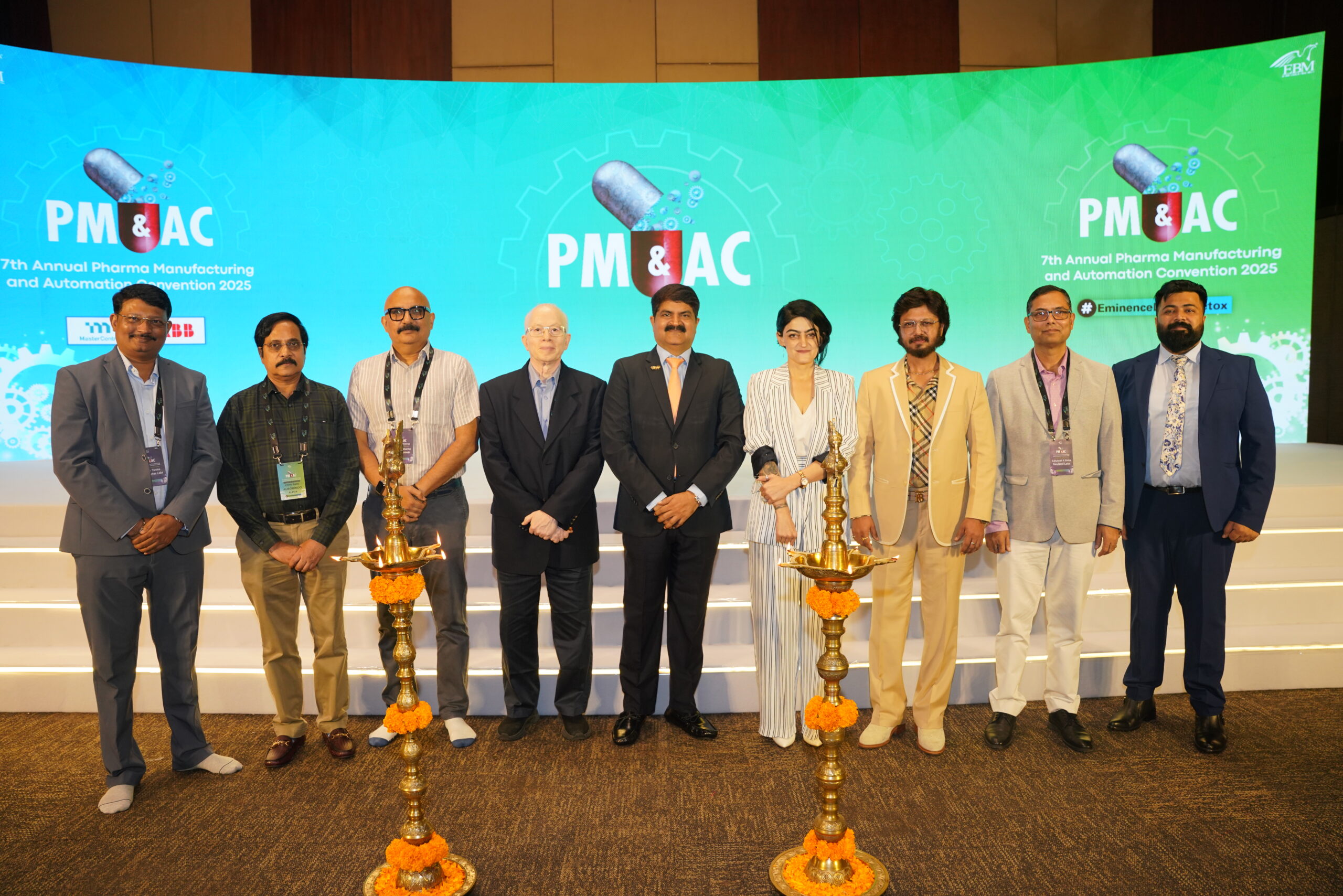
Mr. Souvik Nandi – Senior General Manager – Themis Medicare LTD
Artificial intelligence (AI) encompasses a broad spectrum of techniques that have been utilized by pharmaceutical companies for decades, including machine learning, deep learning, and other advanced computational methods. AI algorithms are revolutionizing drug discovery by accelerating the process, reducing costs, and increasing success rate of drug development. AI analyze vast datasets, predict drug efficacy and safety, and identify promising drug candidates more efficiently than traditional methods. This leads to faster identification of potential drug candidates and a shorter time to market.
The four evolutionary stages of manufacturing have brought us to Pharma 4.0. The first stage comprised the implementation of steam power to mechanization. The second involved mass production, and the introduction of the assembly line, powered by electricity. The third stage added computers and automation into the mix, and the fourth is the introduction of cyber-physical systems that enable the computerization of manufacturing. Artificial Intelligence (AI) is revolutionizing traditional drug discovery and development models by seamlessly integrating data, computational power, and algorithms. This synergy enhances the efficiency, accuracy, and success rates of drug research, shortens development timelines, and reduces costs.
Advanced analytics: AI algorithms can help organizations with predictive analytics, forecasting, and business monitoring. These tools help companies understand what events are likely to happen in the future based on past events.
HOW AI ALGORITHMS ARE OPTIMIZING DRUG DISCOVERY:
- Faster Identification of Potential Drug Candidates:
- Target Identification:
AI models analyze biological data to predict viable drug targets, identifying those that are most likely to be effective.
- Compound Screening:
AI can screen millions of chemical compounds in a fraction of the time compared to traditional methods, accelerating the identification of promising candidates.
- Drug Repurposing:
AI helps find novel therapeutic applications for existing, already-approved drugs, saving time and resources.
2. Reduced Time-to-Market:
- Accelerated Discovery:
AI algorithms significantly speed up the discovery process, from target identification to lead optimization, reducing the time it takes to bring new drugs to market.
- Improved Clinical Trial Optimization:
AI can analyze patient data to identify suitable trial candidates, predict potential adverse effects, and optimize trial design, making clinical trials more efficient and effective.
- Predictive Analytics:
AI can predict how different compounds will behave and interact, reducing the need for extensive experimental trials.
- Optimizing Drug Properties:
- Lead Optimization:
AI algorithms can predict the biological activity and drug-like properties of novel compounds, helping researchers optimize the properties of lead compounds.
- Drug Formulation:
AI assists in optimizing drug formulations for better absorption and targeted delivery, further reducing the need for extensive testing.
- Personalized Medicine:
AI can analyze patient data to develop personalized treatment plans, leading to more effective drug selection and dosage.
4. AI-Driven Tools and Technologies:
- Virtual Screening:
AI allows for virtual screening of compound libraries to identify molecules with the highest likelihood of binding to specific targets.
- In Silico Trials:
AI enables computer-based trials that mimic human trials, predicting safety and efficacy before real physical trials.
- Generative AI:
Generative AI can help generate new molecules and modify existing ones, accelerating drug discovery and development.
Additionally, AI helps to minimize the use of in vivo bioassays, reducing animal sacrifice. AI has far-reaching applications beyond medicine, including healthcare management, surgeries, mRNA vaccination, preventive treatments, and nutrigenomics. However, it is important to note that AI models are meant to complement human intelligence, not replace it. AI models may have comparable or better predictive ability than human researchers, but they still lack human intuition.
INTRODUCING AI IN PHARMA INDUSTRY INITIATE JOB LOSS FOR EMPLOYEES (RESKILLING MANPOWER IS SOLUTION FOR THIS MYTH)
Reskilling is the immediate need in the AI ERA for Pharma Professionals. It is quite absurd to state that presence of AI is creating job loss in the Pharmaceutical sector. To stay competitive, pharmaceutical companies must proactively address this challenge through extensive reskilling and upskilling initiatives. Reskilling is not just about retaining talent; it’s a strategic move to maximize AI’s potential and navigate the evolving industry landscape. Those who act now to equip their workforce with future-ready skills will lead innovation and adapt to the changing dynamics of the pharmaceutical sector.
In the words of a key industry figure, “AI won’t replace people; people who know AI will replace people.”
AI has immense potential in resolving any issues related to any aspects within Pharmaceutical industry. From New Drug Development to manufacturing of Pharmaceutical products with proper tracking after post marketing is the beauty of AI applications But regarding job related volatility after advent of AI in this noble sector is creating a huge turbulence in the job security of the employees.
IMPACT OF AI’S ON PHARMA JOBS
- The evolving landscape of Artificial Intelligence (AI) in the pharmaceutical sector signifies more than just a technological shift; it represents a profound restructuring of the industry’s job market.
- According to a World Economic Forum study, by 2025, AI and automation are expected to displace around 85 million jobs globally while simultaneously creating 97 million new ones, highlighting the transformative potential of AI in the job market.
- Routine and repetitive tasks, such as data analysis and documentation, are seamlessly being taken over by AI systems. This shift allows professionals to focus on more complex and strategic aspects of drug development. Allows Employees to focus more on crucial issues than performing repetitive jobs.
- University of Oxford study estimating the generation of millions of jobs requiring technical, strategic, and creative skills, such as AI specialists, data scientists, and computational biologists – showcasing the industry’s demand for individual’s adept at navigating the intersection of technology and pharmaceutical science.
- Reskilling is imperative for professionals navigating the dynamic pharmaceutical industry, characterized by rapid advancements in science and technology. Recent data highlights the urgency, revealing that companies prioritizing reskilling initiatives have experienced a noteworthy 15% improvement in overall operational efficiency.
- Pharma 4.0, which focuses on leveraging technology and digital advancements in pharmaceutical manufacturing and operations, is not directly causing job layoffs, but it is contributing to a broader restructuring and efficiency drive that has led to job cuts in the industry.
CONCLUSION
Pharmaceutical companies that view reskilling as a long-term investment, rather than a one-time cost, are better positioned to unlock the full potential of AI. Building AI-ready talent pools enables these companies to accelerate innovation. As healthcare technologies continue to evolve, lifelong reskilling becomes increasingly critical for both professionals and organizations to stay competitive in the data-driven landscape of the future where AL will play a hand to hand support role in every areas of pharmaceutical industry starting from drug development, Personalized medicinal therapy solutions, Target Identification, Optimized Drug manufacturing Drug marketing, Efficient Data Analytics, Align to Regulatory Compliance , Enhance Supply Chain Optimization and Enhance Pharmacovigilance.






